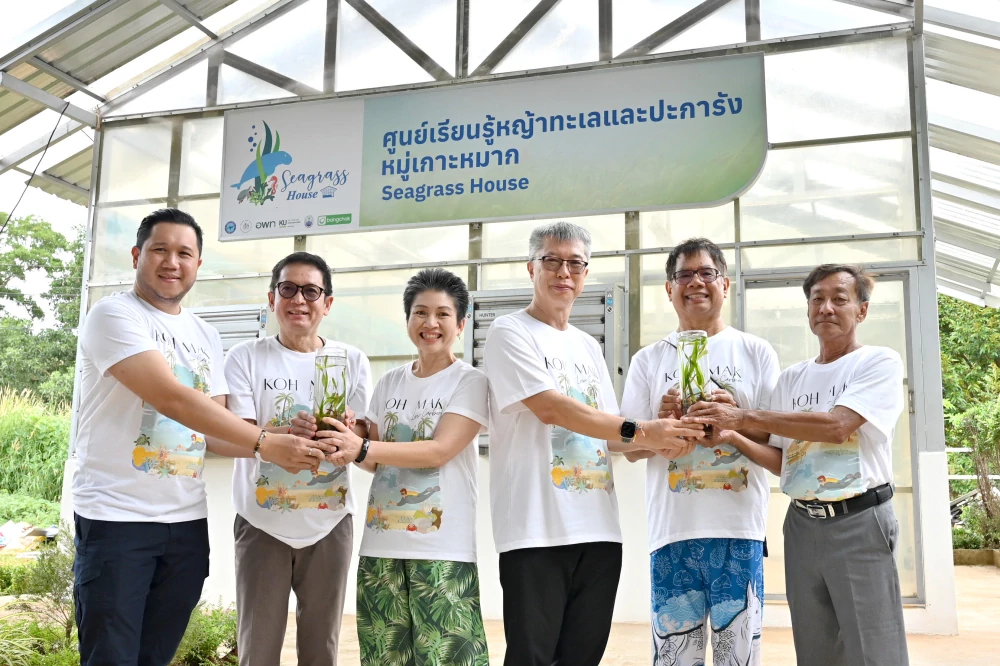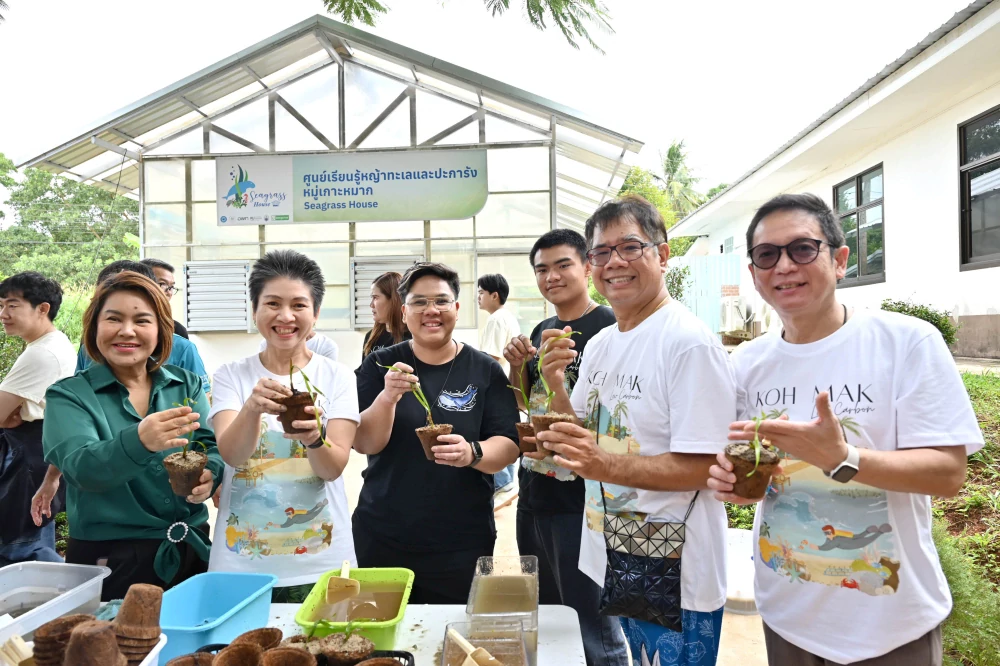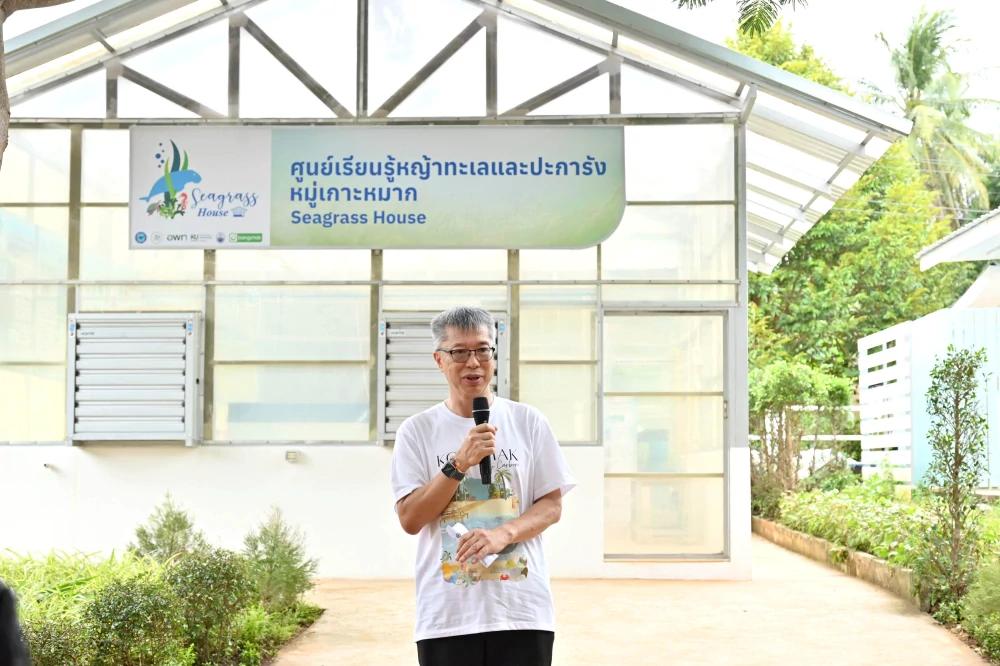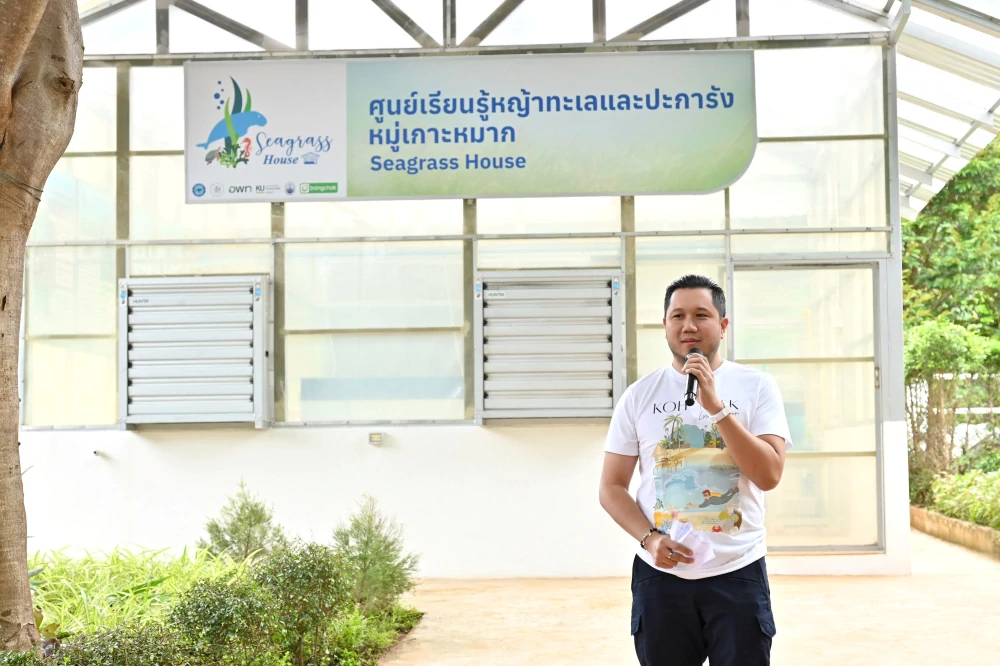24 October 2025
Bangchak Launches Thailand’s First Private-Led “Seagrass Learning Center for Climate Action” with Partners on Koh Mak Expanding Seagrass Ecosystem Conservation, Advancing Low-carbon Tourism, and Promoting a Sustainable Blue Economy

Bangchak Corporation Public Company Limited, together with the Faculty of Fisheries, Kasetsart University; the Designated Areas for Sustainable Tourism Administration (Public Organization); the Koh Mak Subdistrict Administrative Organization; and the Ban Ao Nid Integrated Farming Community Enterprise (Coral Conservation Group), launched the “Seagrass House (Seagrass Learning Center for Climate Action), Koh Mak, Trat Province,” Thailand’s first community-based learning center initiated by the private sector and its partners for the benefit of local communities. The initiative stems from the Memorandum of Understanding on “Developing Koh Mak toward a Low Carbon Destination,” signed in 2022, with the aim of expanding marine ecosystem conservation alongside low-carbon tourism, enhancing local communities’ capacity to adapt to climate change, and promoting a sustainable Blue Economy.
Bangchak and its partners have combined academic expertise with local wisdom to advance marine research and ecosystem restoration, resulting in the tangible establishment of the “Seagrass House (Seagrass Learning Center for Climate Action)” on Koh Mak. The Center was created to ensure sustainable conservation with potential for long-term expansion, in line with the commitment of all partners to continuously support Koh Mak’s Low Carbon Destination goal, following its recognition as one of the Top 100 Green Destinations Worldwide in 2022.
Mrs. Gloyta Nathalang, Senior Executive Vice President, Sustainability Management and Corporate Communications, Bangchak Corporation, said that the impacts of climate change may seem distant to many people, but they are much closer to our daily lives, especially for communities that depend on natural resources and can clearly perceive changes in the ecosystem. The people of Koh Mak, for example, have experienced a decline in marine life, the need to fish farther from shore, and coral bleaching caused by rising sea temperatures. These situations reflect the urgency of addressing global warming seriously and sustainably.
Bangchak’s participation in the Low Carbon Destination project, as a leading energy company committed to achieving Net Zero by 2050 and building a Net Zero Ecosystem that connects and supports collaboration among all sectors, demonstrates the company’s determination to develop sustainable business innovation in harmony with the environment and society.
Over the years, Bangchak has collaborated with Dr. Thon Thamrongnawasawat, Associate Dean of the Faculty of Fisheries, Kasetsart University, to raise awareness about climate change. In 2022, the company signed the Memorandum of Understanding on “Developing Koh Mak toward a Low Carbon Destination” with the Faculty and its partners. The collaboration included studies on the carbon sequestration potential of seagrass meadows and exploration of areas for ecosystem restoration, generating new knowledge and leading to the development of approaches focused on maintaining nature’s balance. This effort resulted in the establishment of the “Seagrass House, Koh Mak,” or “Seagrass Learning Center for Climate Action,” Thailand’s first community-based initiative by the private sector and local partners. The Center follows scientific principles to promote knowledge of seagrass as a Blue Carbon ecosystem capable of absorbing and storing carbon dioxide, nature’s equivalent of forests in the sea. With guidance from the Faculty of Fisheries team as mentors, local networks have been able to carry out seagrass conservation and restoration in a continuous and sustainable manner. The Center also uses renewable solar energy to reduce carbon emissions, serving as a concrete example of Low Carbon Destination development. Bangchak, Kasetsart University, and their partners will continue to jointly monitor, support, and provide technical advice to local networks as appropriate.
Mr. Non Suwatchananon, President of the Koh Mak Subdistrict Administrative Organization, said that Koh Mak Low Carbon marked the beginning of the island’s growing recognition. Through the promotion of low-carbon tourism, Koh Mak was certified as one of the Top 100 Green Destinations and ranked second in Environmental Management in 2025. While being recognized as a Green Destination, the island must continue to evolve by improving public facilities to meet the diverse needs and growth of various visitor groups, while preserving its distinctive local identity. The goal is to enhance tourism value by promoting higher-quality, sustainable tourism, particularly among upper-income travelers, to create richer travel experiences in harmony with sustainability.
Mr. Siripakorn Cheawsamoot, Director of the Designated Areas for Sustainable Tourism Administration (Public Organization), said that DASTA has been driving Koh Mak to become Thailand’s first Low Carbon Destination by applying the Global Sustainable Tourism Criteria (GSTC) as a framework for sustainable tourism development and management. In 2012, the public, private, and community sectors signed the Koh Mak Declaration to promote integrated carbon reduction. Later, in 2018, a community forum was held among local residents, business operators, and agencies to define shared approaches for harmonious coexistence, leading to the creation of the “Koh Mak Charter.” These efforts resulted in Koh Mak being selected as one of the world’s Top 100 Sustainable Destinations.
He added that by 2027, DASTA aims to develop and elevate Thailand’s model destinations to become leading examples of sustainable tourism, bringing happiness and distributing income to local communities through continuous ecosystem and infrastructure development in designated areas. This will also help improve Thailand’s ranking in the Travel & Tourism Development Index (TTDI), particularly in the areas of natural resource management and environmental sustainability. Achieving these goals requires cooperation from all relevant sectors, as reflected in the establishment of the “Seagrass Learning Center for Climate Action” on Koh Mak today.
Asst. Prof. Dr. Suriyan Thanyachanukij, Dean of the Faculty of Fisheries, Kasetsart University, said that on behalf of the Faculty of Fisheries, he would like to thank Bangchak Corporation, the Koh Mak Subdistrict Administrative Organization, DASTA, the Ban Ao Nid Integrated Farming Community Enterprise, and the Koh Mak Coral Conservation Group for their support in bringing the Faculty’s seagrass research from the academic shelf to practical implementation in the community through the Seagrass Learning Center for Climate Action on Koh Mak. He expressed great appreciation in seeing over ten years of the Faculty’s seagrass research applied to strengthen local capacity and collaboration, serving as a model for ecosystem restoration that benefits the planet. Importantly, the Koh Mak area now serves as Thailand’s first community-based seagrass nursery using seedlings from seed propagation and tissue culture, minimizing disturbance to natural stocks. This approach will help ensure sustainable conservation and restoration of seagrass ecosystems in the area, with all partners continuing to work together as academic mentors for the community to achieve long-term ecosystem sustainability.
Mr. Noppadol Suttithanakul, President of the Ban Ao Nid Integrated Farming Community Enterprise and the Koh Mak Coral Conservation Group, said that he was delighted and grateful to all partners for their support, whether through knowledge, funding, facilities, or ongoing mentorship, which has enabled the conservation team to operate effectively. The Koh Mak Coral Conservation Group is committed to continuous learning and capacity development so the team can better care for local natural resources and the surrounding environment. The seagrass meadows and coral reefs are vital sources of food and livelihood for the community. As President of the Conservation Group, he is determined to share accurate scientific knowledge on seagrass and coral restoration and to strengthen partnerships with all stakeholders to pass on these natural treasures to future generations.
“The Koh Mak Seagrass House, or Seagrass Learning Center for Climate Action”, serves not only as a destination for eco-tourists but also as a learning hub for environmental and clean energy education. It offers visitors opportunities to learn about natural resource conservation while experiencing the local way of life. The Center also stands as a model of collaboration among government agencies, academia, the private sector, and civil society in driving low-carbon communities in tangible ways that can be expanded to other areas nationwide. The initiative reflects Bangchak’s brand idea, “Greenovate to Regenerate,” which aims to restore nature’s value and create lasting benefits for local communities and the world.





